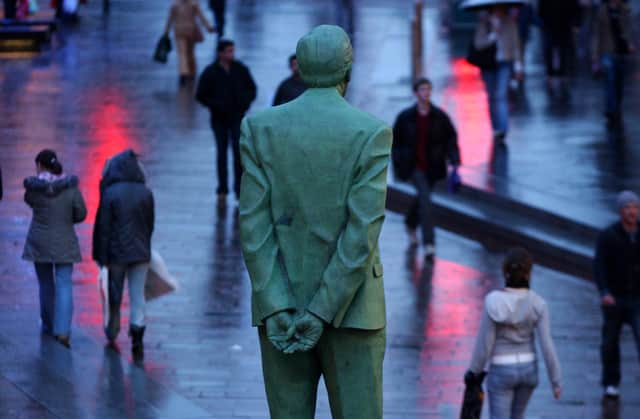Henry McLeish: After Nicola Sturgeon, why It is time to revisit devolution and take the long view


The reasons are obvious. For eight years the First Minister has totally dominated, the SNP, Scottish politics, her signature issue of independence, and the minds and mood of much of the Scottish electorate. Exiting the top job will raise however significant issues for her party, the traditional parties, especially Labour, and the country she served so well.
For the SNP, and setting aside the potentially divisive issue of electing a new leader, this is a watershed moment, but the big question is what happens to independence? Whilst there has been speculation on the many and varied reasons for her stepping down, her failure to deliver independence is the key issue. Faced with a similar situation in 2014, her predecessor Alex Salmond resigned. The “never quite succeeding”, approach is taking its toll despite nearly 16 years of intense campaigning, often at the expense of effective governing.
Advertisement
Hide AdAdvertisement
Hide AdThe Scottish people are not convinced about leaving the United Kingdom. Recent opinion polling suggests that the electorate is, growing weary of the battles between unionism and nationalism supposedly being fought on their behalf, concerned about important policies being neglected and the sense that there is too much campaigning in Scotland and not enough government taking place.
Two realities must be obvious to the SNP. There has been little progress made on independence since 2014. Scotland has performed less well than it should have done, because of the excessive focus on a single party issue, to the exclusion of others. Does the SNP confront reality and modify their thinking, a view increasingly endorsed by the electorate, or does the Party double down on their existing policy and strategy?
For Labour, this could be a spectacular change in their fortunes, but only if they seize the opportunities in this new political space and talk about alternatives to independence. Can they offer new thinking about Scotland’s role in a transformed union, which they can help shape, as the prospect of a Labour Government at Westminster in 2024 now seems likely. Will they see themselves leading a new phase of the devolution, accepting that that the early years of devolution gave way to a campaign for independence in 2007, when identity politics was pushing hard for attention. The SNP captured the mood of Scotland, and the rest is history.
But today a new and more intelligent approach to Westminster is needed, where a four- nation solution to the problems of the Union is long overdue and where Scotland could play a key role in bringing new life to an old and out of touch union. Scotland needs to build consensus and embrace the illusive idea of a “settled will”. It is worth remembering the divisive, enduring and indeed poisonous legacy, of the narrow Brexit vote which should act as a warning to those who deny the need for a broader degree of consensus on how Scotland should move forward.
But Labour in Scotland must be clear as it rethinks its strategy. Westminster remains locked in the past. The lure of greatness, exceptionalism, centralism, and absolute sovereignty still grip the institution.
As the political parties recalibrate, in the aftermath of Nicola Sturgeon’s resignation, several factors are worth recognising.
The campaign for independence is stumbling and losing momentum. The minds and moods of Scots are understandably elsewhere. SNP exhortations to Westminster look increasingly weak and desperate rather than representing those of a confident and unified country.
Scotland is deeply divided over independence. As President Abraham Lincoln once famously said, “a house divided against itself cannot stand.” There is no majority support for independence, but Scots remain restless and looking for alternatives. which the traditional Westminster parties in Scotland have failed to conceive, never mind deliver.
Advertisement
Hide AdAdvertisement
Hide AdWhat does a vote for independence mean? Is it a vote to exit the UK or a vote that reflects the failure of Westminster to face up to new realities and as a consequence the SNP has become Scotland’s voice, a lightning rod for protest, dissent, grudge, grievance, ambition, sentiment and even Scottishness?
Traditional parties must think, talk and act differently not embracing independence or nationalism or federalism or home rule or devo max, but instead building for the long term when bigger decisions can be made. This is the long view, a journey not a destination.
Scotland has stalled, but the relentless focus on independence continues to dominate SNP thinking and actions. Extensive areas of public policy such as resilience, building interdependencies, tackling deep seated health inequalities, nation building, institutional reform, wealth and opportunity creation, the demographic challenge, growing and diversifying the economy, are being downplayed or ignored.
Relative to all of this, it is worth noting the words of the late Donald Dewar. The day after the passing of the Scotland Act on the 18th of November 1998, he said in the Spectator lecture, “clearly the debate should not stop when the doors of the Scottish Parliament open. What we have done in Scotland may be a catalyst for further change”, and added, “It would be absurd to think the UK is so fragile that any change to the constitutional settlement is bound to result in the fracturing of the whole” His insights remain remarkably prescient.
It is time to revisit devolution and take the long view.
Scotland must be honest with itself and replace myths, and wishful thinking about where we are and where we are going, with a more considered assessment of constitutional alternatives. But so too, must Westminster.
Comments
Want to join the conversation? Please or to comment on this article.